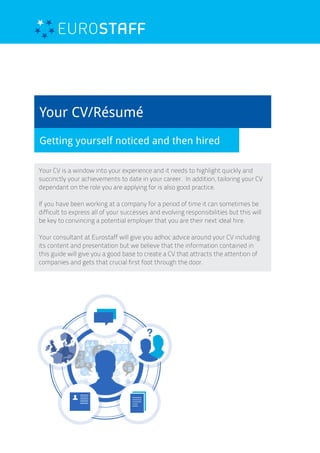Eurostaff | CV Tips (Permanent Employment)
- 1. Your CV/Résumé Getting yourself noticed and then hired Your CV is a window into your experience and it needs to highlight quickly and succinctly your achievements to date in your career. In addition, tailoring your CV dependant on the role you are applying for is also good practice. If you have been working at a company for a period of time it can sometimes be difficult to express all of your successes and evolving responsibilities but this will be key to convincing a potential employer that you are their next ideal hire. Your consultant at Eurostaff will give you adhoc advice around your CV including its content and presentation but we believe that the information contained in this guide will give you a good base to create a CV that attracts the attention of companies and gets that crucial first foot through the door.
- 2. Am I Showing What I Can Really Do? Making your CV stand out to employers 2 www.eurostaffgroup.com Main Duties and Responsibilities What interviewers really care about is whether you can do the job. You would be surprised at how many CVs our consultants come across that give no indication as to what they did on a daily basis at the previous jobs. You must be specific, what exactly were your duties? What were the key details of your job that your potential new employer will want to hear about? Projects Employees in the technology industry will be well accustomed to working on projects. Employers are extremely keen to hear about your experiences. What projects did you work on? What were your responsibilities and what were your achievements? This is the perfect chance to talk yourself up! Structure of Your CV With regards to the layout of your CV, here is how we think you should set it out: Employment Experience This should go at the very top of your CV with your most recent job at the top. Include exact dates and justify any gaps in a positive light. Your employment experience should follow a career statement which consists of a brief paragraph outlining your skills and motivations for progress in your career. This section will obviously involve what you have written for your main duties and responsibilities. Education & Certifications Next you should list your academic qualifications as well as any relevant certifications you have achieved Languages As we work with clients and companies all over Europe listing your linguistic capabilities could push you to the top of the queue for a new job. For example, if you are looking to move to Belgium and you can speak French and Dutch this gives you a wide scope of roles to choose from.


